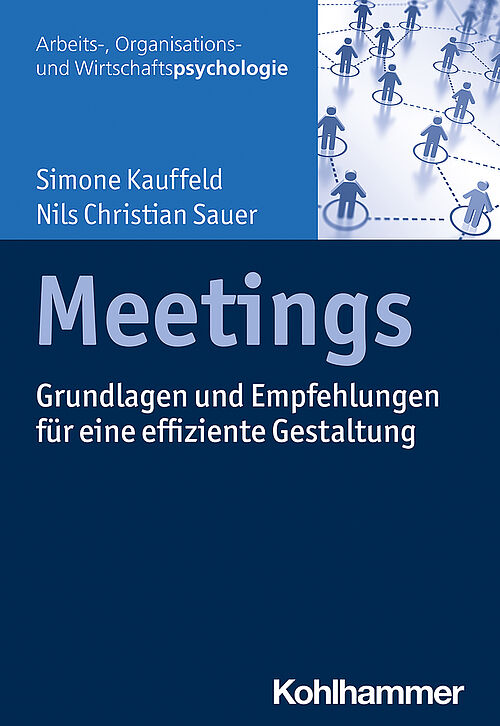2019
Estel, V., Schulte, E.-M., Spurk, D., & Kauffeld, S. (2019). LMX Differentiation Is Good for Some and Bad for Others: A Multilevel Analysis of Effects of LMX Differentiation in Innovation Teams. Cogent Psychology, 6
Handke, L., & Kauffeld, S. (2019). Alles eine Frage der Zeit? Herausforderungen virtueller Teams und deren Bewältigung am Beispiel der Softwareentwicklung. Gruppe. Interaktion. Organisation. Zeitschrift für Angewandte Organisationspsychologie (GIO), 50(1), 33-41. doi: 10.1007/s11612-019-00445-5
Handke, L., Schulte, E.-M., Schneider, K., & Kauffeld, S. (2019). Teams, Time, and Technology: Variations of Media Use over Project Phases. Small Group research 50(2), 266-305. doi:10.1177/1046496418824151
Handke, L., Klonek, F. E., Parker, S. K., & Kauffeld, S. (2019). Interactive Effects of Team Virtuality and Work Design on Team Functioning. Small Group Research. Advance online publication. doi: 10.1177/1046496419863490
Heuer, K., Müller-Frommeyer, L. C., & Kauffeld, S. (2019). Language Matters: The Double-Edged Role of Linguistic Style Matching in Work Groups. Small Group Research. Advance online publication. doi: 10.1177/1046496419874498
Meinecke, A. L., Handke, L., Müller-Frommeyer, L. C., & Kauffeld, S. (2019). Capturing non-linear temporally embedded processes in organizations using recurrence quantification analysis. European Journal of Work and Organizational Psychology. doi: 10.1080/1359432X.2019.1658624
Meinecke, A. L., & Kauffeld, S. (2019). Engaging the Hearts and Minds of Followers: Leader Empathy and Language Style Matching During Appraisal Interviews. Journal of Business and Psychology, 34(4), 485-501. DOI: 10.1007/s10869-018-9554-9
2018
Handke, L., Schulte, E.-M., Schneider, K., & Kauffeld, S. (2018). The medium isn’t the message: Introducing a measure of adaptive virtual communication. Cogent Arts & Humanities. doi: 10.1080/23311983.2018.1514953
Schneider, K., Klünder, J., Kortum, F., Handke, L., Straube, J., & Kauffeld, S. (2018). Positive affect through interactions in meetings: The role of proactive and supportive statements. Journal of Systems and Software, 143, 59-70. doi: 10.1016/j.jss.2018.05.001
Straube, J., Meinecke, A. L., Schneider, K., & Kauffeld, S. (2018). Effects of Media Compensation on Team Performance: The Role of Demographic Faultlines. Small Group Research, 49(6). doi: 10.1177/1046496418796281
2017
Grille, A., Kauffeld, S., Sauer, N, & Schulte, E.-M. (2017). Führung teilen, Leistung ernten mit dem Online-Tool SPLIT. PERSONALquarterly, 1-2017, 26-33.
Kauffeld, S., Sauer, N., & Handke, L. (2017). Shared Leadership. Gruppe. Interaktion. Organisation. Zeitschrift für angewandte Organisationspsychologie (GIO), 48, 235-238. doi: 10.1007/s11612-017-0381-7
Lehmann-Willenbrock, N., Chiu, M. M., Lei, Z. & Kauffeld, S. (2017). Understanding positivity within dynamic team interactions: A statistical discourse analysis. Group & Organization Management. doi:10.1177/1059601116628720
Meinecke, A. L., Klonek, F. E., & Kauffeld, S. (2017). Appraisal participation and perceived voice in annual appraisal interviews: Uncovering contextual factors. Journal of Leadership & Organizational Studies. doi:10.1177/1548051816655990
Meinecke, A. L., Lehmann-Willenbrock, N., & Kauffeld, S. (2017). What happens during annual appraisal interviews? How leader-follower interactions unfold and impact interview outcomes. Journal of Applied Psychology, 102(7), 1054-1074. doi:10.1037/apl0000219
2016
Endrejat, P. C., & Kauffeld, S. (2016). Über innovationsverhindernde und innovationsfördernde Denkweisen [About Innovation Impeding and Innovation Facilitating Mindsets]. Gruppe. Interaktion. Organisation. Zeitschrift für Angewandte Organisationspsychologie (GIO)
Kauffeld, S. & Güntner, A.V. (2016). Teilnehmer-Typologie. Wer Besprechungen trägt, behindert, anderswo sein sollte. Organisationsentwicklung, 4, 29-35. [pdf]
Kauffeld, S., Handke, L. & Straube, J. (2016). Verteilt und doch verbunden: Virtuelle Teamarbeit. Gruppe. Interaktion. Organisation. Zeitschrift für angewandte Organisationspsychologie, 47 (1), 43-51.
Klonek, F. E., Quera, V., Burba, M. & Kauffeld, S. (2016). Group interactions and time: Using sequential analysis to study group dynamics in project meetings. Group Dynamics: Theory, Research, and Practice, 20, 209-222.
Lehmann-Willenbrock, N., Beck, S. J. & Kauffeld, S. (2016). Emergent team roles in organizational meetings: Identifying communication patterns via cluster analysis. Communication Studies, 1, 37-57. [pdf] doi:10.1080/10510974.2015.1074087
Meinecke, A. L., & Kauffeld, S. (2016). Interaktionsanalyse in Gruppen: Anwendung und Herausforderungen. Gruppe.Interaktion.Organisation. (GIO), 47, 321-333. doi:10.1007/s11612-016-0347-1
Meinecke, A. L., Klonek, F. E., & Kauffeld, S. (2016). Using observational research methods to study voice and silence in organizations. German Journal of Human Resource Management, 30, 195-224. doi:10.1177/2397002216649862.
Meyer, B, Schermuly, C. C. & Kauffeld, S. (2016). That’s not my place: The interacting effects of faultlines, subgroup size, and social competence on social loafing behavior in work groups. European Journal of Work and Organizational Psychology, 1, 31-49. doi:10.1080/1359432X.2014.996554
Paulsen, H. F. K. & Kauffeld, S. (2016). Ansteckungsprozesse in Gruppen. Die Rolle von geteilten Gefühlen für Gruppenprozesse und -ergebnisse. Gruppe. Interaktion. Organisation. Zeitschrift für angewandte Organisationspsychologie, 47(4), 357-364. doi:10.1007/s11612-016-0340-8
Paulsen, H. F. K., Klonek, F. E., Schneider, K., & Kauffeld, S (2016). Group affective tone and team performance: A week level study in project teams. Frontiers in Communication 1, 7. doi: 10.3389/fcomm.2016.00007
Sauer, N. C. & Kauffeld, S. (2016). The Structure of Interaction at Meetings: A Social Network Analysis. Zeitschrift für Arbeits- und Organisationspsychologie A&O, 60(1), 33-49. DOI: 10.1026/0932-4089/a000201
Schulte, E.-M., Gessnitzer, S., & Kauffeld, S. (2016). Ich - wir - meine Organisation werden das überstehen! Der Fragebogen zur individuellen, Team- und organisationalen Resilienz (FITOR). Gruppe. Interaktion. Organisation. Zeitschrift für angewandte Organisationspsychologie (GIO), 47, 139-149.
2015
Bavendiek, A., Thiele, L., Meyer, P., Vietor, T., Kauffeld, S. & Fingscheidt, T. (2015). Meetings in the product development process: Applying design methods to improve team interaction and meeting outcomes. Proceedings of the 20th International Conference on Engineering Design (ICED15).
Grille, A. & Kauffeld, S. (2015). Development and preliminary validation of the Shared Professional Leadership Inventory for Teams (SPLIT). Psychology, 6, 75-92.
Grille, A., Schulte, E-M. & Kauffeld, S. (2015). Promoting shared leadership - A multilevel analysis investigating the role of prototypical team leader behavior, psychological empowerment and fair rewards. Journal of Leadership and Organizational Studies, 22, 324-339. doi:10.1177/1548051815570039
Lehmann-Willenbrock, N., Meinecke, A. L., Rowold, J., & Kauffeld, S. (2015). How transformational leadership works during team interactions: A behavioral process analysis. The Leadership Quarterly, 26, 1017-1033.
Sauer, N. C. & Kauffeld, S. (2015). The ties of meeting leaders: A social network analysis. Psychology, 6, 415-434. doi:10.4236/psych.2015.64039
Schneider, K., Liskin, O., Paulsen, H., Kauffeld, S. (2015). Media, Mood, and Meetings: Related to Project Success? ACM Transactions on Computing Education, 15(4), 21
Schulte, E.-M., Lehmann-Willenbrock, N. & Kauffeld, S. (2015). Treat us fairly and we won't complain: Multilevel effects of procedural justice on team meeting interaction. Psychology, 6, 1795-1810.
2013
Kauffeld, S. (2013). Jammerorgien vermeiden. Wie wird eine Sitzung erfolgreich? Forschung und Lehre, 1/2013, 52-53.
Kauffeld, S. & Meinecke, A. (2013). Vorsicht, ansteckend! Personalmagazin, 2/2013, 26-28.
Lehmann-Willenbrock, N., Grohmann, A. & Kauffeld, S. (2013). Promoting multifoci citizenship behavior: Time-lagged effects of procedural justice, trust, and commitment. Applied Psychology: An International Review, 62, 454-485. doi:10.1111/j.1464-0597.2012.00488.x
Lehmann-Willenbrock, N., Allen, J. A. & Kauffeld, S. (2013). A sequential analysis of procedural communication in organizational meetings: How teams facilitate their meetings. Journal of Applied Communication Research, 4, 365-388.
Liskin, O., Schneider, K., Kiesling, S. & Kauffeld, S. (2013). Meeting intensity as an indicator for project pressure: Exploring meeting profiles. Proceedings of the 6th International Workshop on Cooperative and Human Aspects of Software Engineering (CHASE 2013), ICSE 2013.
Sauer, N. C. & Kauffeld, S. (2013). Meetings as networks: Applying social network analysis to team interaction. Communication Methods & Measures, 7, 26-47.
Schulte, E.-M., Fenner, T. & Kauffeld, S. (2013). Nicht ohne Nebenwirkungen: Gesundheitsrisiko Meeting. PERSONALquarterly, 65, 8-15.
Schulte, E.-M., Lehmann-Willenbrock, N. & Kauffeld, S. (2013). Age, forgiveness, and meeting behavior: A multilevel study. Journal of Managerial Psychology, 28, 928-949. doi: 10.1108/JMP-06-2013-0193
Suter, G. & Kauffeld, S. (2013). Meetings im kulturellen Vergleich: Deutsche brauchen Klarheit, Schweizer gute Zuhörer. PERSONALquarterly, 65, 28-33.
2012
Kauffeld, S. (2012). Jammerspiralen in Organisationen. Organisationsentwicklung, 3, 81-86.
Kauffeld, S. & Lehmann-Willenbrock, N. (2012). Meetings matter: Effects of team meetings on team and organizational success. Small Group Research, 43, 130-158.
2011
Jonas, E., Kauffeld, S., Sullivan, D. & Fritsche, I. (2011). Dedicate your life to the company! A terror management perspective on organizational identity. Journal of Applied Social Psychology, 41, 2858–2882. doi:10.1111/j.1559-1816.2011.00854.x
Lehmann-Willenbrock, N., Grohmann, A. & Kauffeld, S. (2011). Task and relationship conflict at work: Development and construct validation of a German version of Jehn’s intragroup conflict scale. European Journal of Psychological Assessment, 27, 171-178. doi:10.1027/1015-5759/a000064
Lehmann-Willenbrock, N., Meyers, R. A., Kauffeld, S., Neininger, A. & Henschel, A. (2011). Verbal interaction sequences and group mood: Exploring the role of planning communication. Small Group Research, 42, 639-668. doi:10.1177/1046496411398397
2010
Lehmann-Willenbrock, N. & Kauffeld, S. (2010). Development and construct validation of the German Workplace Trust Survey (G-WTS). European Journal of Psychological Assessment, 25, 3-10. doi:10.1027/1015-5759/a000002
Neininger, A., Lehmann-Willenbrock, N., Kauffeld, S. & Henschel, A. (2010). Effects of organizational and team commitment - a longitudinal study. Journal of Vocational Behavior, 76, 576-579. doi:10.1016/j.jvb.2010.01.009
2005
Kauffeld, S. (2006). Rezension zu: van Dick, R. & West, M.A. (2005). Teamwork, Teamdiagnose, Teamentwicklung. Zeitschrift für Personalpsychologie, 5, 31-32.
2001
Kauffeld, S. & Frieling, E. (2001). Der Fragebogen zur Arbeit im Team (F-A-T). Zeitschrift für Arbeits- und Organisationspsychologie, 45, 26-33.
Kauffeld, S. & Grote, S. (2001). Teams in Organisationen: Diagnose und Entwicklung. Personalführung, 1, 26-33.

